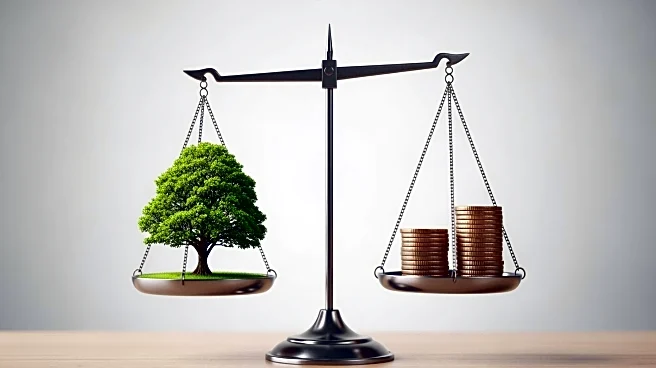What's Happening?
Recent analysis reveals that efforts to reduce carbon dioxide emissions, as part of the Paris Agreement, have been significantly offset by global economic growth. Since the adoption of the Paris Agreement in 2015, the targeted decline in CO2 emissions was
not achieved. Instead, emissions increased by 5.6% over nine years, contrary to the expected 7% decline. This increase aligns closely with historical trends, highlighting the challenge of balancing economic growth with environmental commitments. The United States, China, and Germany have shown varying degrees of success in reducing carbon intensity, yet overall emissions have risen due to rapid economic expansion.
Why It's Important?
The findings underscore the complexity of addressing climate change while pursuing economic growth. The increase in emissions despite improved carbon intensity indicates that economic expansion can negate environmental gains. This situation presents a 'super wicked problem' where the aspirations for economic development conflict with environmental sustainability. The United States, for instance, reduced its emissions by 10%, but this was insufficient to meet its Nationally Determined Contributions (NDCs). The broader implication is that without significant policy changes and technological advancements, achieving the Paris Agreement's goals remains challenging.
What's Next?
Countries are expected to update their NDCs to reflect more ambitious targets. The Glasgow Climate Pact has urged nations to strengthen their commitments, with many countries already increasing their reduction targets by 10% to 25%. However, the probability of meeting these targets remains low, especially for major economies like the United States and China. Continued economic growth without corresponding advancements in emission reduction technologies could further hinder progress. The global community faces the urgent task of reconciling economic and environmental objectives to prevent catastrophic climate outcomes.
Beyond the Headlines
The ongoing struggle to balance economic growth with environmental sustainability raises ethical and policy questions. The disparity in carbon intensity among countries suggests that there is room for improvement, particularly in high-emission nations. The challenge lies in implementing policies that do not stifle economic growth while effectively reducing emissions. This situation calls for innovative solutions and international cooperation to ensure that economic aspirations do not compromise the planet's future.
















